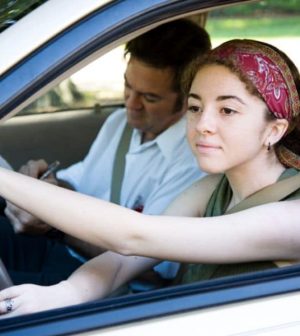- Could Your Grocery Store Meat Be Causing Recurring UTIs?
- Are You Making This Expensive Thermostat Error This Winter?
- Recognizing the Signs of Hypothyroidism
- 10 Strategies to Overcome Insomnia
- Could Artificial Sweeteners Be Aging the Brain Faster?
- Techniques for Soothing Your Nervous System
- Does the Water in Your House Smell Funny? Here’s Why
- Can a Daily Dose of Apple Cider Vinegar Actually Aid Weight Loss?
- 6 Health Beverages That Can Actually Spike Your Blood Sugar
- Treatment Options for Social Anxiety Disorder
Keeping Your Teen Driver Safe

Rules for new drivers instituted in Massachusetts back in 2007 have led to fewer car crashes, including fewer deadly crashes, among drivers in their teens.
And most of the rules are ones that Moms and Dads can set no matter what state you live in.
The Massachusetts “graduated driver licensing program” requires 16- and 17-year-olds to gain a certain level of experience before getting a full license. It includes driver restrictions and education mandates, as well as penalties for infractions.
There are also stringent penalties for violating the law that prohibits unsupervised teen driving at night, which was designed to reduce the risk of sleep-related crashes. Parents can set limits on the hours their new driver is behind the wheel at night and establish their own penalty, such as a week’s allowance, for breaking the rule.
The program calls for significant teen driver education and training. Even though many kids learn to drive from their parents, you might consider paying for at least an abbreviated driving school course for your youngster. Massachusetts increased the required number of hours of supervised driving, added a two-hour driver education course for parents, and upped penalties for many moving and passenger restriction violations.
Parents also might spend more hours in the car with their new driver and be extra vigilant about not letting them drive with friends or other youngsters for six to 12 months, even their siblings, regardless of whether your state allows it (many do not during early learning).
You can find out whether your state has a graduated driver licensing program on the website of the Governors Highway Safety Association at https://www.ghsa.org/state-laws/issues/Teen-and-Novice-Drivers.
Most of these programs include guidelines for:
- A learner stage with supervised driving.
- An intermediate stage with limited unsupervised driving in high-risk situations, such as nighttime driving.
- A full privilege stage with a standard driver’s license.
More information
The organization Safe Kids Worldwide has a detailed report on how parents can help reduce risks for teen drivers with infographics and tips.
Source: HealthDay
Copyright © 2026 HealthDay. All rights reserved.










